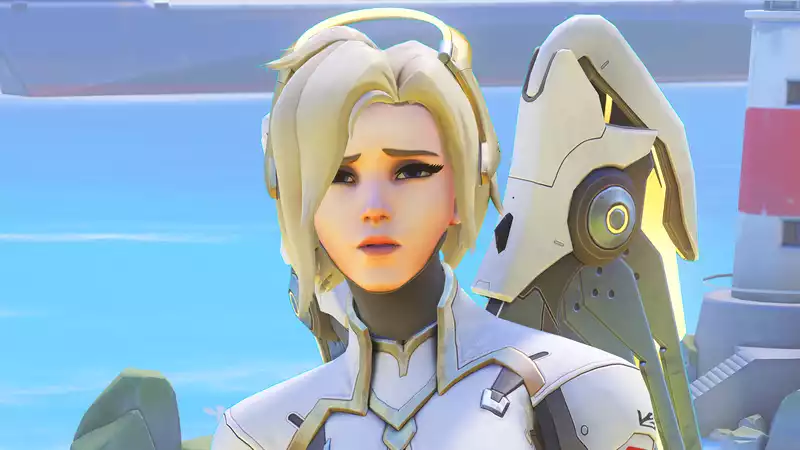Blizzard is about to bring the hammer down on the way "Overwatch 2" is played. The changes will take effect when Season 9 launches later this month.
For the first time in the history of the hero-shooter, all tank and DPS heroes will self-heal, making them less dependent on support during matches. With the new passive ability, tanks and DPS will gradually regain strength outside of active combat. This is a "tune-down of the support self-healing passive," wrote game director Aaron Keller in a blog post today. This, plus further changes to mitigate "damage spikes during combat" will be detailed in another blog post closer to the season's opening.
If there is one word to describe the current state of balance in Overwatch 2, it is tumultuous. The most recent season saw the introduction of a new tank hero, Mauga. He was inexplicably equipped with the killing power of Bastion, a robot that literally transforms into a machine gun. Mauga single-handedly ruined matches at all skill levels as he quickly moved between the world's most fragile tanks and the world's most deadly tanks. Counterplay was next to impossible. The only answer was to buy him yourself and shoot back until someone else won, and "Overwatch" Season 8 was a nightmare until Blizzard dropped a bucket of nerfs on him this week that lead hero designer Alec Dawson said "might be tougher than necessary."
The Mauga actually has the ability to heal itself when it takes damage. In fact, most tanks have the means to buffer their health with shields and healing. While I agree that this is necessary in a world where there is no longer a second tank to protect the team, a self-healing passive for all three roles is a band-aid and would teach players to be more independent than they are now.
Overwatch used to celebrate teamwork, but now it has become such a nasty little burden that every time there is a balance change or hero release, the goal is to mitigate it. By minimizing the opportunity for support to intervene, the distinction between the three roles blurs and the web that holds the team together melts away together. Instead of a balletic venue for teamwork, these changes flatten Overwatch into a cartoonish shooting gallery. It removes some of the pressure from the support player to keep everyone alive because they now have more control over their own health pool," he says. The goal, he writes, is to make Overwatch "a little less frustrating" when teams are not working together.
"We still want Overwatch to be defined by team strategy and mechanics, but we feel this can be set back a bit now and maybe even more in the future," he wrote.
Throughout the entire duration of Overwatch 2, Blizzard has tried to balance the strict teamwork that was at the heart of the original Overwatch with the lone-wolf style of play that attracted solo players. Numerous changes and reworkings to the maps and heroes have made "Overwatch 2" a faster and deadlier game. Encounters that used to last for minutes, with teams setting up on the map like a chess game, are now over in seconds, at a speed where one or two players can wipe everyone out from any angle. just trying to understand what's going on while watching an "Overwatch" match in 2016 It was hard, and it's just as hard when you actually play. Overall, passive self-healing risks making the game even more chaotic when you don't have to stick around and wait for it to recover.
To combat this growing instability, Blizzard is experimenting with a dynamic spawn system that forces players to respawn with teammates. In Season 9, the system will be adjusted to "make the effect more pronounced." "Keller said the "Overwatch" team is also considering other features to promote teamwork, such as the ability to see allies' health bars on screen, as in PvE mode. adding party frames, as in MMOs and MOBAs, is "likely," Keller Keller added.
This news, along with a time-limited sped-up version of Quick Play later this week, makes it seem as though Blizzard isn't sure what direction it will take "Overwatch" and is leaving it up to players to beta test it this year.
"Looking at the future of 'Overwatch' a year or two from now, I think we'll see a few more heroes and maps added, not the exact same game we're playing now," Keller wrote. The game should always evolve with new systems and features that benefit the player."
Frequent shifts in meta are inherent in live-service games, but fundamental changes such as those advocated by Keller are likely to change the very definition of what it means to play "Overwatch."
It is a risky move for a game that already has a steep learning curve. With the rules changing so drastically from season to season, it will be difficult to experience that euphoric moment when you have successfully turned the tide of the game by mobilizing all the tactical knowledge you have developed. Worse, it diminishes the point of learning tactics in the first place. As we saw with Mauga, imbalance can make the game worse for everyone, and if Blizzard over-corrects too many times, players may begin to lose patience as they struggle to keep up with a game they don't seem to understand.
.

Comments